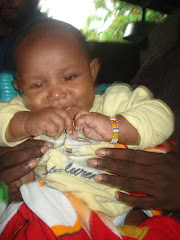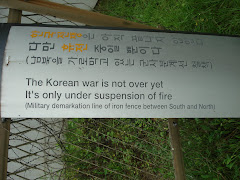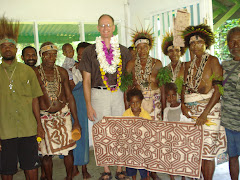Wednesday, February 27, 2008
Laef blong Solomons
I am still puzzling out why I can't upload pictures from this internet cafe in Honiara, but I guess you'll just have to wait until I get to another country! Lots of great photos, friends!
"Laef blong Solomons" is Solomon Islands pijin for "Life in the Solomon Islands."
February 15 I traveled out to our training house on West Guadalcanal, called Hautambu. 45 Franciscan brothers gathered there for the regional chapter. My arrival as Minister General was celebrated with a "warrior's welcome." This welcome means 12 men wearing loin cloths and body paint, brandishing axes, spears and knives leaped out of the undergrowth shouting in their native languages. My attention had been distracted by a comment from the driver of the truck so I didn't see the men, and I was startled! They circled the truck, shouting and threatening us, forcing it to come to a halt. I was surrounded and herded up the path where more men, similarly dressed, were gathered under a flower-decorated arch and chalked sign board: "Welcome to Hautambu." They began playing bamboo flutes and pan pipes, and with welcoming smiles places a huge wreath of flowers on my neck and led me into the friary courtyard. Everyone then began to sing a song of welcome and I was given a bundle of betel nut and green coconuts as a traditional welcome gift.
Clenching my fists so I wouldn't burst into tears, I finally responded with gratitude and joy and we all prayed for a happy time together as we met in chapter.
That night there was a huge Island feast for me and the other guest of honor, the Regional Minister of Papua New Guinea, Br. Laurence Hauje, SSF. We had wonderful pudding, chicken, pork, melons and pineapples. After dinner there was a pan pipe concert with much singing and dancing.
Saturday we feasted again, welcoming all the members of the regional chapter, and then Sunday we had the opening Eucharist for the Chapter.
It was a remarkable meeting, listening to the huge variety of things the brothers are doing in the Solomon Islands and the challenges they face in their daily living. They are involved with hospital visits and prison visiting on Guadalcanal, Malaita and Makira Islands. The brothers carry out many missions to remote villages, often hiking hours up slippery trails to conduct Bible Study, youth work and healing work among the sick. In addition to this evangelism, they plant and maintain huge gardens, since food is too expensive to buy. Every friary needs to grow kumara, cassava, varieties of greens, papaya, bananas and coconuts, which is the daily diet, supplemented with fish or chicken when it is available.
Afternoons after the meetings, there was time for "sport," some playing soccer, or in my case, going for long runs along the road threading it's way along the coast through fabulous villages. It was a bit disconcerting to have children burst into tears of fright at seeing a white man, but after a few days of seeing me jogging they happily waved.
The last night of the Chapter, Saturday February 23, I was presented with a beautiful necklace with a large shell carving of the Franciscan coat of arms. The necklace, I am told, is traditional bride price for Malaita Island. So in some happy way the necklace is a symbol of love, commitment and fraternity.
Returning to Honiara I have been sharing the brother's life and ministry, and experiencing life in Honiara--power cuts, water shortages, garbage pile ups. The brothers visit the Central Hospital every Sunday and Wednesday morning to give Holy Communion. I hope never to have to stay in this hospital: I noticed a frog in the hall way and the wards were crowded with people. Every patient has numerous people sleeping nearby or under the bed. The families provide food and crucial nursing assistance to the patients. But it was noisy and hot in the wards.
I am very proud of the brothers and their commitment to pastoral work and providing a refuge for all comers to the urban friary, Patteson House.
The power has cut three times while I've been composing this, so I will post it while I can!
Saturday I go to Papua New Guinea: the pilgrimage continues.
"Laef blong Solomons" is Solomon Islands pijin for "Life in the Solomon Islands."
February 15 I traveled out to our training house on West Guadalcanal, called Hautambu. 45 Franciscan brothers gathered there for the regional chapter. My arrival as Minister General was celebrated with a "warrior's welcome." This welcome means 12 men wearing loin cloths and body paint, brandishing axes, spears and knives leaped out of the undergrowth shouting in their native languages. My attention had been distracted by a comment from the driver of the truck so I didn't see the men, and I was startled! They circled the truck, shouting and threatening us, forcing it to come to a halt. I was surrounded and herded up the path where more men, similarly dressed, were gathered under a flower-decorated arch and chalked sign board: "Welcome to Hautambu." They began playing bamboo flutes and pan pipes, and with welcoming smiles places a huge wreath of flowers on my neck and led me into the friary courtyard. Everyone then began to sing a song of welcome and I was given a bundle of betel nut and green coconuts as a traditional welcome gift.
Clenching my fists so I wouldn't burst into tears, I finally responded with gratitude and joy and we all prayed for a happy time together as we met in chapter.
That night there was a huge Island feast for me and the other guest of honor, the Regional Minister of Papua New Guinea, Br. Laurence Hauje, SSF. We had wonderful pudding, chicken, pork, melons and pineapples. After dinner there was a pan pipe concert with much singing and dancing.
Saturday we feasted again, welcoming all the members of the regional chapter, and then Sunday we had the opening Eucharist for the Chapter.
It was a remarkable meeting, listening to the huge variety of things the brothers are doing in the Solomon Islands and the challenges they face in their daily living. They are involved with hospital visits and prison visiting on Guadalcanal, Malaita and Makira Islands. The brothers carry out many missions to remote villages, often hiking hours up slippery trails to conduct Bible Study, youth work and healing work among the sick. In addition to this evangelism, they plant and maintain huge gardens, since food is too expensive to buy. Every friary needs to grow kumara, cassava, varieties of greens, papaya, bananas and coconuts, which is the daily diet, supplemented with fish or chicken when it is available.
Afternoons after the meetings, there was time for "sport," some playing soccer, or in my case, going for long runs along the road threading it's way along the coast through fabulous villages. It was a bit disconcerting to have children burst into tears of fright at seeing a white man, but after a few days of seeing me jogging they happily waved.
The last night of the Chapter, Saturday February 23, I was presented with a beautiful necklace with a large shell carving of the Franciscan coat of arms. The necklace, I am told, is traditional bride price for Malaita Island. So in some happy way the necklace is a symbol of love, commitment and fraternity.
Returning to Honiara I have been sharing the brother's life and ministry, and experiencing life in Honiara--power cuts, water shortages, garbage pile ups. The brothers visit the Central Hospital every Sunday and Wednesday morning to give Holy Communion. I hope never to have to stay in this hospital: I noticed a frog in the hall way and the wards were crowded with people. Every patient has numerous people sleeping nearby or under the bed. The families provide food and crucial nursing assistance to the patients. But it was noisy and hot in the wards.
I am very proud of the brothers and their commitment to pastoral work and providing a refuge for all comers to the urban friary, Patteson House.
The power has cut three times while I've been composing this, so I will post it while I can!
Saturday I go to Papua New Guinea: the pilgrimage continues.
Sunday, February 10, 2008
The Solomon Islands
I arrived in the Solomon Islands Saturday February 2. It was wonderful to see the brothers at Patteson House in Honiara, the capitol of the country. Our friary is located among a cluster of Church of Melanesia buildings: the Archbishop's office, a house for the sisters of the Church, a household of the Melanesian Brotherhood. The friary is a very active place with people sleeping on the floor of the main building, others storing their luggage, dropping by to talk with the brothers. All of this activity and the demands on the brothers wearies them, yet it is a beautifully Franciscan life and ministry.
Tuesday I left for the Malaita province, traveling on the Solomon Express. It is a highly air conditioned ship; I was fairly miserable. It was a relief to get to Auki on Malaita Island. Br. Steven and an inquirer, Andrew, met me at the wharf and took me up the hill to the friary. I was greeted by Br. Clifton, an old friend. That evening we walked to one of the neighborhoods of Auki, Kokum, and I preached at St. Hugh's parish.
Wednesday was Ash Wednesday, and after a 6:00 a.m. liturgy most of us got into a pick up truck for a bone-jarring three and a half hour journey to Malu'u to see Br. Noel Nikki. Noel spend 6 months with the brothers at Little Portion Friary in New York, and it was a great joy to see him and the place where he is studying to become a nurse's assistant. Speaking with the Director of the program he expressed real worry that there would be insufficient funding for the next term. During the trip I was thinking about all the different ways I have spent Ash Wednesday. This year's observance with it's long trip and the central concern for healing seemed an appropriate theme for prayer and repentance for me as an American for all the people who have inadequate roads and health care. My personal preoccupation was with persistent diarrhea, forcing us to stop occasionally. Rather than dust to dust, I think water to water...A nurse I requested Immodium from said they didn't have such medicines and not to worry as this is the season for diarrhea. I would be okay in 3 days. And she was right.
The next day was another trip, this time by foot up a mountain to a small village where our oldest Solomon Island Brother lives, Br. Colin. He has lived in Fou'ala for many years and has built up a school for girls there that attracts young women from all over the Solomons. When he started, girls were often neglected educationally. I was delighted to be able to celebrate Eucharist that evening and later to meet all of the villagers; long lines of them formed across the playing field and I walked along shaking hands with each of them!
Friday we were up and slipped our way down a rain soaked path to the road. We returned to Auki in time to refresh ourselves for a 3 mile walk to Busa, a village in the hills behind the town. It was a fiercely hot day. The brothers were given land there, and have built a beautiful friary. In addition to raising their own food they assist in the local parish teaching Sunday School, working with youth, and visiting the sick.
The return trip to Honiara on Saturday was on a miserable ship that had no air conditioning and hundreds of people, and inadequate sanitation, creating many ripe odors. This is the way most people in the Solomons travel island to island. Often they are on such ships for day at a time.
Sunday found us driving through pounding rains, over rivers swollen by rain and full of mud from eroding forests caused by poor logging practices. We went out to Vuru so tht I could preach and celebrate there. The weather cleared, and we had a really fantastic lunch with the local people who come to mass at the friary. The brothers built the house themselves, and also run a kindergarten with about 25 students and 3 teachers.
Tuesday I left for the Malaita province, traveling on the Solomon Express. It is a highly air conditioned ship; I was fairly miserable. It was a relief to get to Auki on Malaita Island. Br. Steven and an inquirer, Andrew, met me at the wharf and took me up the hill to the friary. I was greeted by Br. Clifton, an old friend. That evening we walked to one of the neighborhoods of Auki, Kokum, and I preached at St. Hugh's parish.
Wednesday was Ash Wednesday, and after a 6:00 a.m. liturgy most of us got into a pick up truck for a bone-jarring three and a half hour journey to Malu'u to see Br. Noel Nikki. Noel spend 6 months with the brothers at Little Portion Friary in New York, and it was a great joy to see him and the place where he is studying to become a nurse's assistant. Speaking with the Director of the program he expressed real worry that there would be insufficient funding for the next term. During the trip I was thinking about all the different ways I have spent Ash Wednesday. This year's observance with it's long trip and the central concern for healing seemed an appropriate theme for prayer and repentance for me as an American for all the people who have inadequate roads and health care. My personal preoccupation was with persistent diarrhea, forcing us to stop occasionally. Rather than dust to dust, I think water to water...A nurse I requested Immodium from said they didn't have such medicines and not to worry as this is the season for diarrhea. I would be okay in 3 days. And she was right.
The next day was another trip, this time by foot up a mountain to a small village where our oldest Solomon Island Brother lives, Br. Colin. He has lived in Fou'ala for many years and has built up a school for girls there that attracts young women from all over the Solomons. When he started, girls were often neglected educationally. I was delighted to be able to celebrate Eucharist that evening and later to meet all of the villagers; long lines of them formed across the playing field and I walked along shaking hands with each of them!
Friday we were up and slipped our way down a rain soaked path to the road. We returned to Auki in time to refresh ourselves for a 3 mile walk to Busa, a village in the hills behind the town. It was a fiercely hot day. The brothers were given land there, and have built a beautiful friary. In addition to raising their own food they assist in the local parish teaching Sunday School, working with youth, and visiting the sick.
The return trip to Honiara on Saturday was on a miserable ship that had no air conditioning and hundreds of people, and inadequate sanitation, creating many ripe odors. This is the way most people in the Solomons travel island to island. Often they are on such ships for day at a time.
Sunday found us driving through pounding rains, over rivers swollen by rain and full of mud from eroding forests caused by poor logging practices. We went out to Vuru so tht I could preach and celebrate there. The weather cleared, and we had a really fantastic lunch with the local people who come to mass at the friary. The brothers built the house themselves, and also run a kindergarten with about 25 students and 3 teachers.
Subscribe to:
Comments (Atom)





